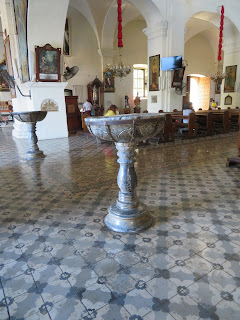worship at the cathedral 5 - laetare sunday
This
Sunday is Laetare Sunday. So many things
had been said about the color and the antiphon of this Sunday and so many still
will be said about them today, and so I would like to be excused. Instead I would like to write something that
I just discovered about this Sunday and I hope it would add another level of
meaning to what we already knew so well.
Unknown
to many and to me, this Sunday is also called "Dominica de Rosa" or
Rose Sunday. It is not referring
primarily to the color of the vestments which is old rose (Not pink, ok! [which
is the reason why some priests may not be so at home with the color or wearing
it, they elicit some smiles from the faithful] By the way, my professor in
liturgy once told us in one of his classes that universally, pink is the male
color and blue is feminine [in the Philippines, it's the other way around],
which explains the Virgin Mother's color.
Is this true?).
Going
back, Rose Sunday does not primarily refer to the color of the vestments but to
a tradition still being practiced today of the pope giving a golden rose to
royalty, military figures, governments, shrines and churches as a token of his
reverence and affection. And traditionally
the pope blesses this rose and gives it to the recipient on the fourth Sunday
of Lent. In 2016 for example Pope Francis gave the golden rose to the Shrine of
the Black Madonna in Czestochowa and in 2013 it was given to the Basilica of
Our Lady of Guadalupe.
The
rose is made of gold, intricately made by artisans, and like all roses then
(before genetics came into the picture) its stem has thorns and symbolically
they are gold tinted in red. Why a gift
of rose in the middle of Lent? Pope Leo XIII in his sermon on the
conferral of the golden rose explained the symbolism saying, the rose "shows the sweet odor of Christ
which should be widely diffused by His faithful followers and the thorns and
red tint of the petals refer to His bloody Passion."
Its
significance is further explained by Pope Innocent III who said: "As Lætare Sunday, the day set apart for the
function, represents love after hate, joy after sorrow, and fullness after
hunger, so does the rose designate by its color, odor, and taste, love, joy and
satiety respectively. The rose is
the flower spoken of by Isaiah (11:1), "there shall come forth a rod out
of the root of Jesse, and a flower shall rise up out of his root."
Today the severity of Lent (that is if we have
been seriously observing the sacrifices of lent) is interrupted in the middle
(the middle of the 40 days of penitence is actually last Thursday) so that we
will be reminded what this is all about.
We are not fasting just for the sake of fasting (although some need
fasting to slim down), we are not abstaining for the sake of abstaining like a
bunch of masochistic persons who like to torture ourselves. We are not doing penance in self-hatred or just
for the love of it. We are made to look
beyond our penance as we are made to look beyond the passion and death of Jesus
to his resurrection when he has conquered sin and death. and brought new life
to the world. He is after all the golden
rose whose thorns are tinted in red. In
the middle of lent we are reminded to look up and not to be bowed down, to look
forward and not to be simply self-absorbed, for beyond this penances is the
resurrection, beyond this dying is life - "the love after the hate, the joy
after sorrow, the fullness after hunger."

Comments